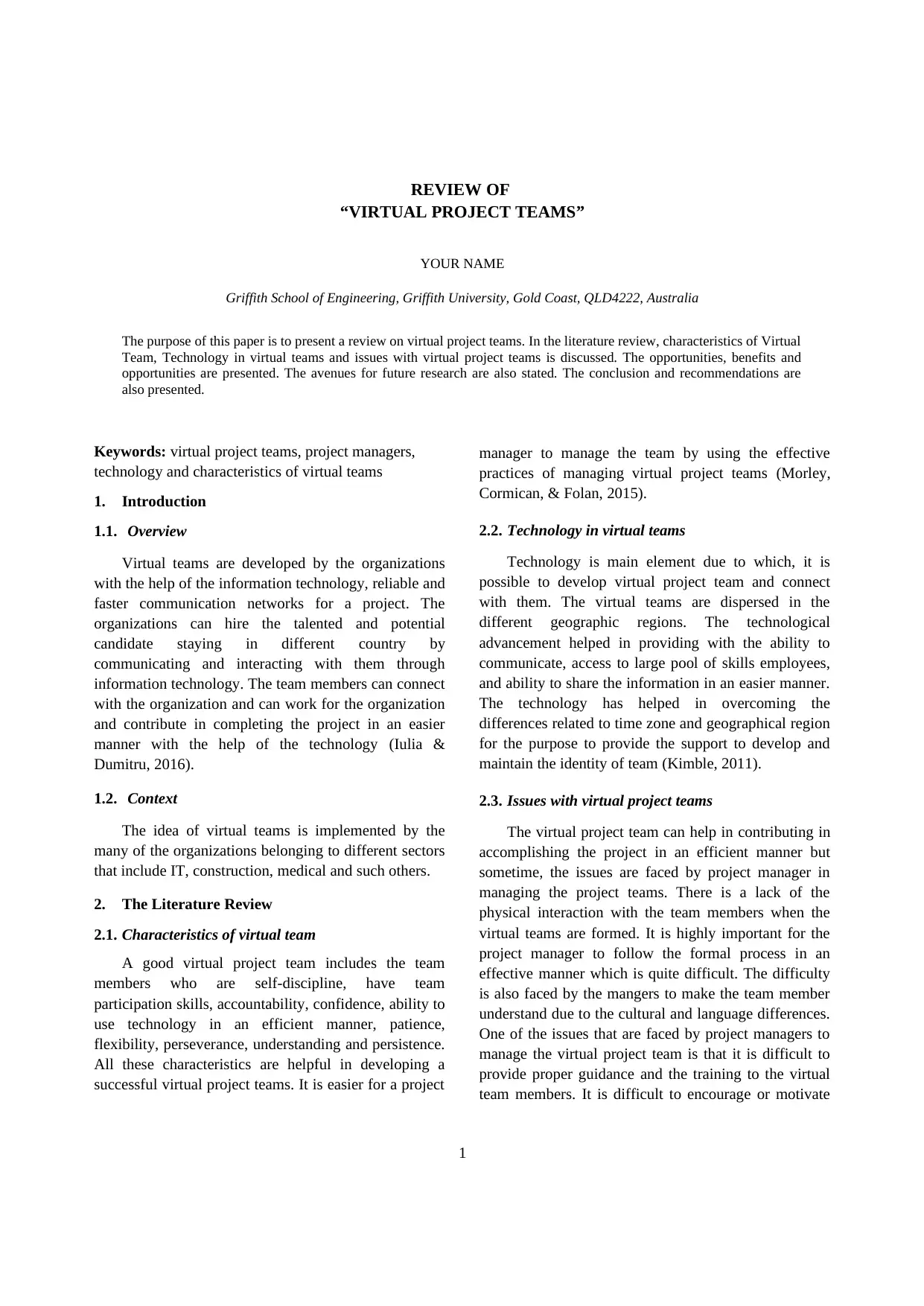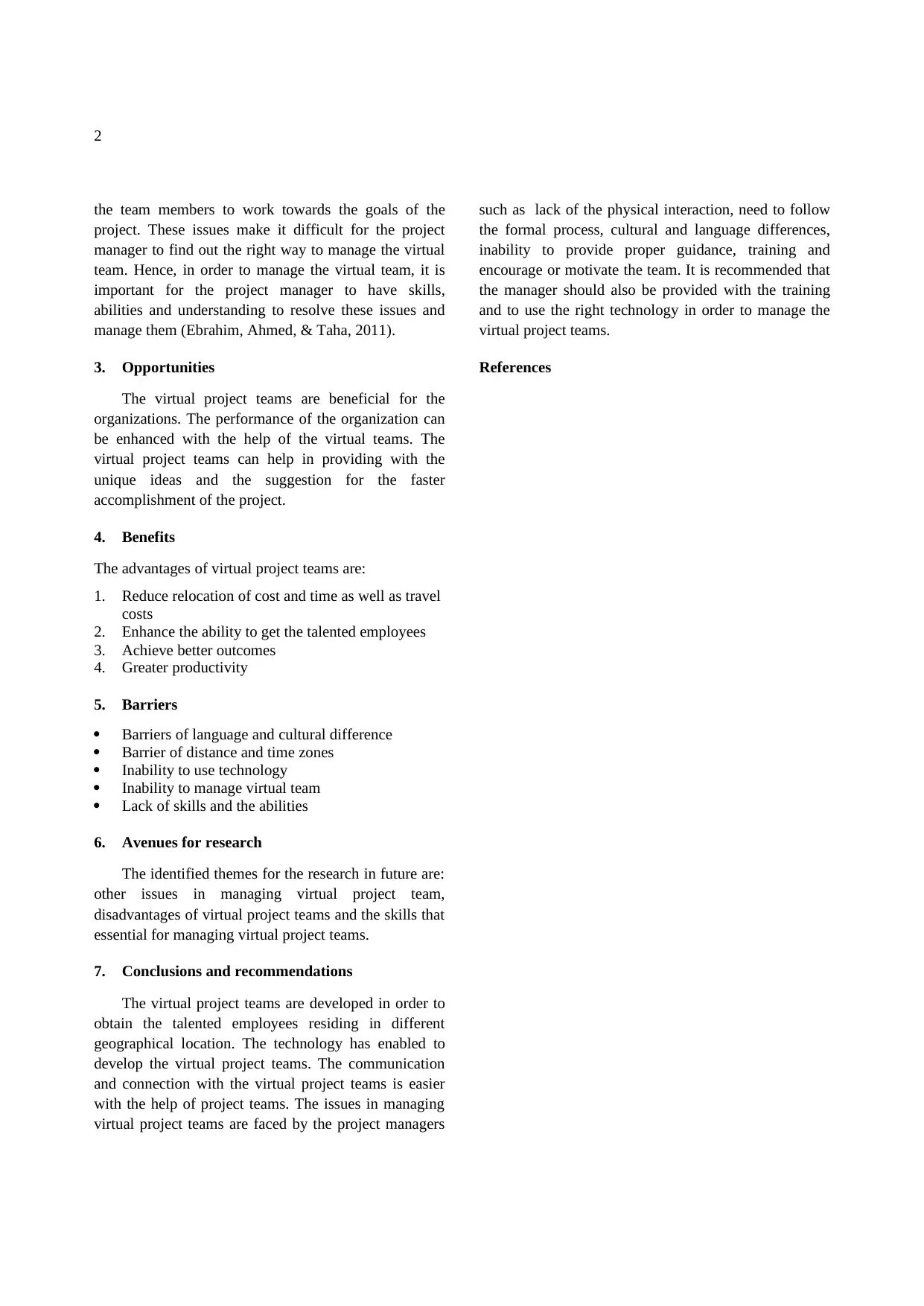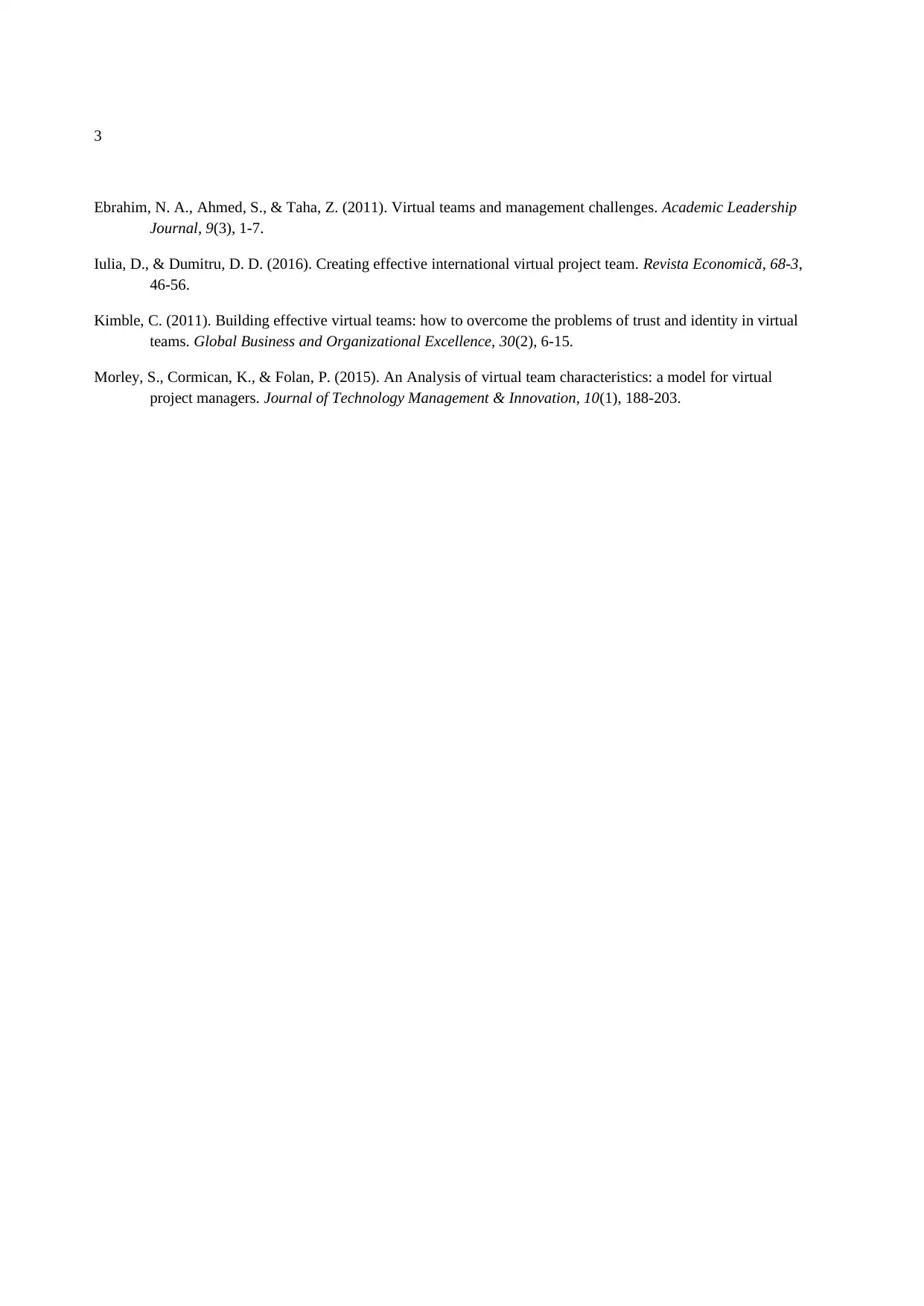Critical Review of Virtual Project Teams - Griffith University
VerifiedAdded on 2023/06/05
|3
|1088
|128
Literature Review
AI Summary
This paper presents a review of virtual project teams, exploring their characteristics, the role of technology, and the challenges associated with their management. It discusses the essential attributes of successful virtual team members, the impact of technology on team communication and collaboration, and the issues project managers face, such as cultural differences and lack of physical interaction. The review highlights the opportunities and benefits of virtual teams, including cost reduction, access to a wider talent pool, and increased productivity. It also identifies barriers to virtual team success, such as language differences and technology limitations. Finally, it suggests avenues for future research, focusing on unresolved issues, disadvantages, and essential management skills. The review concludes by recommending training for managers and the use of appropriate technology to effectively manage virtual project teams. Desklib provides a platform for students to access similar solved assignments and study resources.

REVIEW OF
“VIRTUAL PROJECT TEAMS”
YOUR NAME
Griffith School of Engineering, Griffith University, Gold Coast, QLD4222, Australia
The purpose of this paper is to present a review on virtual project teams. In the literature review, characteristics of Virtual
Team, Technology in virtual teams and issues with virtual project teams is discussed. The opportunities, benefits and
opportunities are presented. The avenues for future research are also stated. The conclusion and recommendations are
also presented.
Keywords: virtual project teams, project managers,
technology and characteristics of virtual teams
1. Introduction
1.1. Overview
Virtual teams are developed by the organizations
with the help of the information technology, reliable and
faster communication networks for a project. The
organizations can hire the talented and potential
candidate staying in different country by
communicating and interacting with them through
information technology. The team members can connect
with the organization and can work for the organization
and contribute in completing the project in an easier
manner with the help of the technology (Iulia &
Dumitru, 2016).
1.2. Context
The idea of virtual teams is implemented by the
many of the organizations belonging to different sectors
that include IT, construction, medical and such others.
2. The Literature Review
2.1. Characteristics of virtual team
A good virtual project team includes the team
members who are self-discipline, have team
participation skills, accountability, confidence, ability to
use technology in an efficient manner, patience,
flexibility, perseverance, understanding and persistence.
All these characteristics are helpful in developing a
successful virtual project teams. It is easier for a project
manager to manage the team by using the effective
practices of managing virtual project teams (Morley,
Cormican, & Folan, 2015).
2.2. Technology in virtual teams
Technology is main element due to which, it is
possible to develop virtual project team and connect
with them. The virtual teams are dispersed in the
different geographic regions. The technological
advancement helped in providing with the ability to
communicate, access to large pool of skills employees,
and ability to share the information in an easier manner.
The technology has helped in overcoming the
differences related to time zone and geographical region
for the purpose to provide the support to develop and
maintain the identity of team (Kimble, 2011).
2.3. Issues with virtual project teams
The virtual project team can help in contributing in
accomplishing the project in an efficient manner but
sometime, the issues are faced by project manager in
managing the project teams. There is a lack of the
physical interaction with the team members when the
virtual teams are formed. It is highly important for the
project manager to follow the formal process in an
effective manner which is quite difficult. The difficulty
is also faced by the mangers to make the team member
understand due to the cultural and language differences.
One of the issues that are faced by project managers to
manage the virtual project team is that it is difficult to
provide proper guidance and the training to the virtual
team members. It is difficult to encourage or motivate
1
“VIRTUAL PROJECT TEAMS”
YOUR NAME
Griffith School of Engineering, Griffith University, Gold Coast, QLD4222, Australia
The purpose of this paper is to present a review on virtual project teams. In the literature review, characteristics of Virtual
Team, Technology in virtual teams and issues with virtual project teams is discussed. The opportunities, benefits and
opportunities are presented. The avenues for future research are also stated. The conclusion and recommendations are
also presented.
Keywords: virtual project teams, project managers,
technology and characteristics of virtual teams
1. Introduction
1.1. Overview
Virtual teams are developed by the organizations
with the help of the information technology, reliable and
faster communication networks for a project. The
organizations can hire the talented and potential
candidate staying in different country by
communicating and interacting with them through
information technology. The team members can connect
with the organization and can work for the organization
and contribute in completing the project in an easier
manner with the help of the technology (Iulia &
Dumitru, 2016).
1.2. Context
The idea of virtual teams is implemented by the
many of the organizations belonging to different sectors
that include IT, construction, medical and such others.
2. The Literature Review
2.1. Characteristics of virtual team
A good virtual project team includes the team
members who are self-discipline, have team
participation skills, accountability, confidence, ability to
use technology in an efficient manner, patience,
flexibility, perseverance, understanding and persistence.
All these characteristics are helpful in developing a
successful virtual project teams. It is easier for a project
manager to manage the team by using the effective
practices of managing virtual project teams (Morley,
Cormican, & Folan, 2015).
2.2. Technology in virtual teams
Technology is main element due to which, it is
possible to develop virtual project team and connect
with them. The virtual teams are dispersed in the
different geographic regions. The technological
advancement helped in providing with the ability to
communicate, access to large pool of skills employees,
and ability to share the information in an easier manner.
The technology has helped in overcoming the
differences related to time zone and geographical region
for the purpose to provide the support to develop and
maintain the identity of team (Kimble, 2011).
2.3. Issues with virtual project teams
The virtual project team can help in contributing in
accomplishing the project in an efficient manner but
sometime, the issues are faced by project manager in
managing the project teams. There is a lack of the
physical interaction with the team members when the
virtual teams are formed. It is highly important for the
project manager to follow the formal process in an
effective manner which is quite difficult. The difficulty
is also faced by the mangers to make the team member
understand due to the cultural and language differences.
One of the issues that are faced by project managers to
manage the virtual project team is that it is difficult to
provide proper guidance and the training to the virtual
team members. It is difficult to encourage or motivate
1
Paraphrase This Document
Need a fresh take? Get an instant paraphrase of this document with our AI Paraphraser

2
the team members to work towards the goals of the
project. These issues make it difficult for the project
manager to find out the right way to manage the virtual
team. Hence, in order to manage the virtual team, it is
important for the project manager to have skills,
abilities and understanding to resolve these issues and
manage them (Ebrahim, Ahmed, & Taha, 2011).
3. Opportunities
The virtual project teams are beneficial for the
organizations. The performance of the organization can
be enhanced with the help of the virtual teams. The
virtual project teams can help in providing with the
unique ideas and the suggestion for the faster
accomplishment of the project.
4. Benefits
The advantages of virtual project teams are:
1. Reduce relocation of cost and time as well as travel
costs
2. Enhance the ability to get the talented employees
3. Achieve better outcomes
4. Greater productivity
5. Barriers
Barriers of language and cultural difference
Barrier of distance and time zones
Inability to use technology
Inability to manage virtual team
Lack of skills and the abilities
6. Avenues for research
The identified themes for the research in future are:
other issues in managing virtual project team,
disadvantages of virtual project teams and the skills that
essential for managing virtual project teams.
7. Conclusions and recommendations
The virtual project teams are developed in order to
obtain the talented employees residing in different
geographical location. The technology has enabled to
develop the virtual project teams. The communication
and connection with the virtual project teams is easier
with the help of project teams. The issues in managing
virtual project teams are faced by the project managers
such as lack of the physical interaction, need to follow
the formal process, cultural and language differences,
inability to provide proper guidance, training and
encourage or motivate the team. It is recommended that
the manager should also be provided with the training
and to use the right technology in order to manage the
virtual project teams.
References
the team members to work towards the goals of the
project. These issues make it difficult for the project
manager to find out the right way to manage the virtual
team. Hence, in order to manage the virtual team, it is
important for the project manager to have skills,
abilities and understanding to resolve these issues and
manage them (Ebrahim, Ahmed, & Taha, 2011).
3. Opportunities
The virtual project teams are beneficial for the
organizations. The performance of the organization can
be enhanced with the help of the virtual teams. The
virtual project teams can help in providing with the
unique ideas and the suggestion for the faster
accomplishment of the project.
4. Benefits
The advantages of virtual project teams are:
1. Reduce relocation of cost and time as well as travel
costs
2. Enhance the ability to get the talented employees
3. Achieve better outcomes
4. Greater productivity
5. Barriers
Barriers of language and cultural difference
Barrier of distance and time zones
Inability to use technology
Inability to manage virtual team
Lack of skills and the abilities
6. Avenues for research
The identified themes for the research in future are:
other issues in managing virtual project team,
disadvantages of virtual project teams and the skills that
essential for managing virtual project teams.
7. Conclusions and recommendations
The virtual project teams are developed in order to
obtain the talented employees residing in different
geographical location. The technology has enabled to
develop the virtual project teams. The communication
and connection with the virtual project teams is easier
with the help of project teams. The issues in managing
virtual project teams are faced by the project managers
such as lack of the physical interaction, need to follow
the formal process, cultural and language differences,
inability to provide proper guidance, training and
encourage or motivate the team. It is recommended that
the manager should also be provided with the training
and to use the right technology in order to manage the
virtual project teams.
References

3
Ebrahim, N. A., Ahmed, S., & Taha, Z. (2011). Virtual teams and management challenges. Academic Leadership
Journal, 9(3), 1-7.
Iulia, D., & Dumitru, D. D. (2016). Creating effective international virtual project team. Revista Economică, 68-3,
46-56.
Kimble, C. (2011). Building effective virtual teams: how to overcome the problems of trust and identity in virtual
teams. Global Business and Organizational Excellence, 30(2), 6-15.
Morley, S., Cormican, K., & Folan, P. (2015). An Analysis of virtual team characteristics: a model for virtual
project managers. Journal of Technology Management & Innovation, 10(1), 188-203.
Ebrahim, N. A., Ahmed, S., & Taha, Z. (2011). Virtual teams and management challenges. Academic Leadership
Journal, 9(3), 1-7.
Iulia, D., & Dumitru, D. D. (2016). Creating effective international virtual project team. Revista Economică, 68-3,
46-56.
Kimble, C. (2011). Building effective virtual teams: how to overcome the problems of trust and identity in virtual
teams. Global Business and Organizational Excellence, 30(2), 6-15.
Morley, S., Cormican, K., & Folan, P. (2015). An Analysis of virtual team characteristics: a model for virtual
project managers. Journal of Technology Management & Innovation, 10(1), 188-203.
⊘ This is a preview!⊘
Do you want full access?
Subscribe today to unlock all pages.

Trusted by 1+ million students worldwide
1 out of 3
Related Documents
Your All-in-One AI-Powered Toolkit for Academic Success.
+13062052269
info@desklib.com
Available 24*7 on WhatsApp / Email
![[object Object]](/_next/static/media/star-bottom.7253800d.svg)
Unlock your academic potential
Copyright © 2020–2026 A2Z Services. All Rights Reserved. Developed and managed by ZUCOL.




